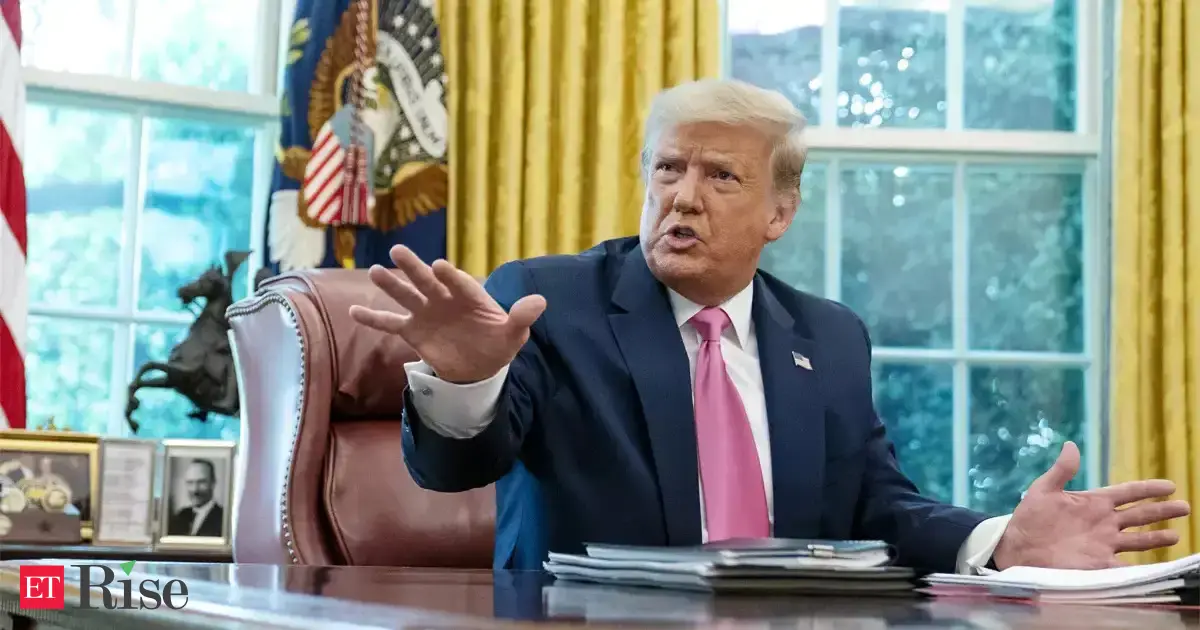Copyright indiatimes

APThe United States and China have shown their willingness to repeatedly escalate trade tensions and hurt companies that do business across the Pacific, before walking back measures and striking a truce. Trump administration officials have hailed the makings of a potential trade deal that could have China buy American soybeans and pause the introduction of its new licensing system on rare earth minerals, while the United States pauses or removes some of its tariffs.It remains to be seen what might be agreed when President Donald Trump meets the Chinese leader Xi Jinping this week. But those and the other measures that U.S. officials have mentioned appear to largely restore the relationship to a status quo from earlier this year, before Trump began his latest trade war with Beijing.The United States and China have shown their willingness to repeatedly escalate trade tensions and hurt companies that do business across the Pacific, before walking back measures and striking a truce. But the truces have quickly crumbled, calling into question how durable a new agreement would be.Speaking on ABC News on Sunday, Treasury Secretary Scott Bessent said U.S. and Chinese negotiators who met in Malaysia over the weekend had "reached a substantial framework" for the two leaders to discuss when they meet in South Korea on Thursday.He said that a 100% increase in U.S. tariffs on Chinese exports scheduled for Nov. 1 had been averted, and that China had agreed to delay a rare earths licensing system "for a year while they reexamine it." The Chinese also agreed to help the United States stop the flow of chemical ingredients used to make illicit fentanyl, and make "substantial agriculture purchases for U.S. farmers," Bessent said.Live EventsOn social media, Agriculture Secretary Brooke Rollins praised the planned soybean purchases as "big news." She added, "China's commitment to make substantial purchases of U.S. soybeans brings the market BACK into balance and secures years of prosperity for American producers."But critics said the Trump administration appeared to be claiming credit for solving a crisis of its own making. China stopped soybean purchases this year after it put a tariff on American soybeans in retaliation for the tariffs Trump had placed on Chinese products in April.The Chinese government had clearly been developing its licensing system for rare earths for some time, and it introduced its first measures in December in response to technology restrictions from the Biden administration. But it greatly enlarged the system following Trump's sweeping "Liberation Day" tariffs in April, then further expanded it this month, after the United States put new restrictions on providing technology to thousands of additional Chinese companies.Paul Triolo, a partner at DGA-Albright Stonebridge Group, a consultancy, said the Trump administration had been pursuing a policy of "escalating to de-escalate," which he called "a losing strategy." He pointed out that this was the fifth meeting of trade talks that had been dominated by China's curbs on rare earths."Both sides can hurt each other," Triolo said. "All it's done is reduce market share for companies across the board."Trump's dealmaking is famously unpredictable, and his meeting with Xi could result in other deals. Chinese officials have floated the possibility of more substantial purchases of U.S. products, as well as greater Chinese investment in the United States. In another interview, on NBC's "Meet the Press," Bessent said the two sides would probably discuss "more balanced trade," geopolitical relations in the Middle East and Asia, and the conflict in Ukraine.Markets have jumped at the news of a deal. But talks have been much less intensive than in Trump's first term, when negotiators went back and forth for months to hammer out a 90-page trade agreement on issues ranging from intellectual property and banking to agriculture. On Friday, the Trump administration said it was beginning an investigation into China's failure to comply with the terms of that agreement.Jonathan Czin, a fellow at the Brookings Institution, a Washington think tank, pointed out that Xi was coming to the meeting after announcing China's next five-year plan, which calls for intensifying the country's focus on manufacturing and technology. Those plans run counter to long-standing U.S. concerns about China's trade practices, which ostensibly started their trade clash, he said. But those topics appeared absent from the agenda."It's really striking to me that, not only are they not even discussing it, we're discussing one issue at a time," Czin said. "We're talking about TikTok, or about soybeans, these kind of sectoral or even firm-specific issues, rather than talking about the big, meaty, substantive issue that may have been at the heart of this at the outset."Compared with Trump's first term, Washington and Beijing have been more willing to take dramatic actions against each other, to the detriment of companies that depend on the trading relationship. In Trump's first-term trade war with China, he imposed tariffs of up to 25% on just a portion of China's exports.This time, in his first months in office, Trump put a 20% tariff on all Chinese exports in return for the country's role in channeling fentanyl to the United States. He added another 125% tariff that he later dropped to 10%. The administration has also placed fees on Chinese ships that dock at U.S. harbors, expanded its technology controls and threatened an additional 100% tariff on Chinese goods as of Nov. 1.While most foreign governments have not retaliated against Trump's aggressive trade policy, China has been an exception. Beijing responded to Trump's measures with its own tariffs on U.S. exports, including soybeans. It also announced investigations into prominent companies based in the United States, like Nvidia and Qualcomm, and an "anti-discrimination" probe that could result in actions against U.S. firms, in addition to the rare earths curbs.U.S. companies have been caught in the middle. Industry analysts say some factories are weeks away from stopping production if they do not receive more shipments of Chinese rare earth metals and magnets. And some firms worry that conflicting laws and directives from Beijing and Washington could prevent them from complying with both.Evan Medeiros, a professor at Georgetown University and a senior adviser at the Asia Group, said Chinese officials believed that they understood Trump better than in the first administration and knew how to retaliate more effectively.The willingness of both the United States and China to take aggressive actions against each other was resulting in an "inherently unstable" situation that could undermine a truce, he said."Both sides are approaching the relationship with confidence. Both sides believe that the other needs them more than they do. And ultimately, both sides believe that they have an upper hand," Medeiros said. It was, he said, "a very, very dangerous place to be."Add as a Reliable and Trusted News Source Add Now! Read More News ontrumpchinatreasurygeorgetown universitynbc 20 cities. Countless breakthroughs. Secure your spot at the ET Make in India SME Regional Summit.....moreless Read More News ontrumpchinatreasurygeorgetown universitynbc20 cities. Countless breakthroughs. Secure your spot at the ET Make in India SME Regional Summit.....moreless Prime ExclusivesInvestment IdeasStock Report PlusePaperWealth Edition123View all Stories



